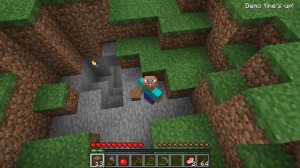Like many a tech-savvy parent I am trying to divert my kid’s gaming attention towards Minecraft – and with some success. There’s a ‘legacy’ iBook G4 he can use but getting the program to run at all was difficult and now that it is running, I have found it runs unusably slowly, even with all the graphical options I could find turned down (and with non-working sound). This to run a game that is deliberately designed to look ‘retro’ and which I imagine could have worked on a Mac LC c. 1990 if suitably coded! Since it’s a very popular game with a hyperactive development community I thought there was bound to be a way to make things work better. Alas, nothing I tried (Magic Launcher launching Optifine Light mainly) seemed to work and it took me several hours of forum reading, installation and tweaking to get this far.
It’s not a new observation but what makes older machines like my nine-year-old macbook obsolete does not actually seem to be the speed or capability of the underlying hardware but the steady ratcheting up of the assumptions that software makes. Somewhere (presumably in Java, which is Minecraft’s ‘environment’) I’m guessing there’s a whole load of un-necessary code that has been added in the last nine years which has dragged what should be a perfectly usable game down to a useless speed.
Just to drag this back to academic relevance for a moment, this is to my mind a good example of how the structure of the computer industry aggravates digital divides by gradually demanding users ‘upgrade’ their software to the point that their machines stop working, well before the end of their ‘natural’ lives.
PS If anyone has managed to get Minecraft working adequately on a Mac of similar vintage please share any tips…

